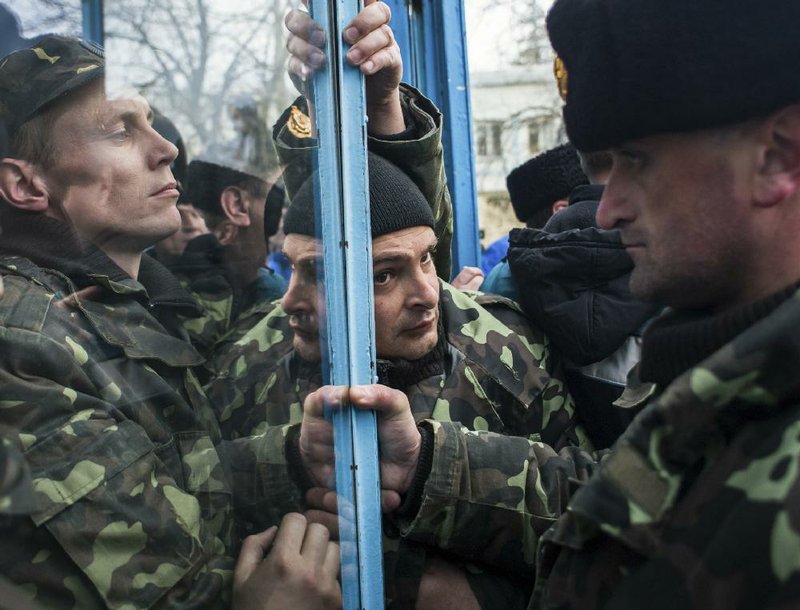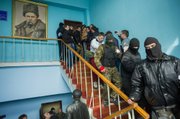KIEV, Ukraine - Russian forces seized military installations across the disputed Crimean Peninsula on Wednesday, prompting Ukraine’s security chief to announce that his country will hold joint military exercises with the United States and Britain.
RELATED ARTICLE
http://www.arkansas…">Putin argument for Crimea split cites ’08 Kosovo
U.S. Vice President Joe Biden was in Lithuania, trying to reassure nations along Russia’s borders that were frightened by the sight of an expansion-minded Moscow.
“We’re in this with you, together,” Biden said.
Ukraine has been powerless to prevent Russian troops from taking control of Crimea, which Russian President Vladimir Putin annexed Tuesday. A day later, masked Russian-speaking troops moved into Ukraine’s naval headquarters in the Crimean city of Sevastopol, detaining the head of Ukraine’s navy and seizing the facility.
Andriy Parubiy, secretary of Ukraine’s National Security and Defense Council, said the government was drawing up plans to evacuate its outnumbered troops from Crimea back to the mainland and will seek United Nations support to turn the peninsula into a demilitarized zone.
He also said Ukraine will hold military maneuvers with the countries that signed the 1994 Budapest Memorandum. He didn’t elaborate.
The document was signed by the U.S., Britain and Russia to guarantee Ukraine’s territorial integrity when it surrendered its share of Soviet nuclear arsenals to Russia after the Soviet Union broke up in 1991. Ukraine has accused Russia of breaching the agreement by taking over the Crimean Peninsula.
In addition, Parubiy said Ukraine decided to leave the Moscow-dominated Commonwealth of Independent States, a loose alliance of 11 former Soviet nations. The last nation to leave the group was Georgia, which lost a brief war with neighboring Russia in 2008 and ended up losing two separatist territories.
In a warning to Moscow, Biden declared that the United States will respond to any aggression against its NATO allies, which include neighbors of Russia.
Standing side by side with two Baltic leaders in Vilnius, Lithuania, Biden said the U.S. was “absolutely committed” to defending its allies, adding that President Barack Obama plans to seek concrete commitments from NATO members to ensure the alliance can safeguard its collective security.
“Russia cannot escape the fact that the world is changing and rejecting outright their behavior,” Biden said after meeting in Vilnius with Lithuanian President Dalia Grybauskaite and Latvian President Andris Berzins.
NATO’s chief said Wednesday that Russia’s advances in Ukraine are the greatest threat to European security since the Cold War, making clear that the military alliance must refocus on risks closer to home after years of fighting in faraway war zones.
“This is a wake-up call,” NATO Secretary-General Anders Fogh Rasmussen told a Washington think tank.
Rasmussen outlined military measures under preparation for NATO countries to respond to Russia, if needed. They include surveillance flights over Poland and Romania, and additional assets for an airspace protection mission over Estonia, Latvia and Lithuania.
Biden announced in Warsaw that in addition to new NATO exercises that will take place in Poland, the U.S. was considering rotating American forces to the Baltic region as a step toward ensuring the collective defense of NATO allies.
Those forces could conduct ground and naval exercises, and engage in training missions. At Warsaw’s request, the U.S. last week sent some 300 air troops and a dozen F-16 fighters to Poland for joint training.
But Obama on Wednesday ruled out the use of the U.S. military in Crimea, saying nobody wants to “trigger an actual war with Russia,” because that would serve no one’s interests.
ADMIRAL DETAINED
The several hundred Russian-speaking troops who captured the base in Sevastopol met no resistance. Sevastopolis also the home port of Russia’s Black Sea Fleet, and tens of thousands of Russian-led troops are now patrolling Crimea.
The base was seized a day after a confrontation between Ukrainian soldiers and pro-Russian militia left two dead.
The Russian-led troops, who arrived on the base after the storming, wore helmets, flak jackets and uniforms with no identifying insignia. By afternoon, they were in full control of the naval headquarters, a set of three-story white concrete buildings with blue trim.
Ukraine’s Defense Ministry said no one was injured in the raid, which it said was led by pro-Russian militiamen and Cossacks.
The ministry said Rear Adm. Sergei Haiduk was detained by unknown people after the takeover of the fleet headquarters. The Russian state ITAR-Tass news agency reported that he was being questioned by Crimean prosecutors.
Ukraine’s defense minister and deputy prime minister had planned to travel to Crimea on Wednesday in what they called a bid to avert an escalation in hostilities - but the pro-Russian leader of Crimea warned they would be turned back.
“They are not welcome in Crimea,” Sergei Aksyonov was quoted as saying by the Interfax news agency. “They will not be allowed to enter Crimea. They will be sent back.”
Interfax later cited Welfare Minister Lyudmila Denisova as saying the officials had been denied entry to Crimea.
On Tuesday, Putin signed a treaty to incorporate Crimea into Russia after a referendum Sunday in which residents of the Black Sea region overwhelmingly backed the move.
Jubilant crowds in Moscow and other cities across Russia hailed the annexation, while Ukraine’s new government called Putin a threat to the “civilized world and international security,” and the U.S. and the European Union threatened tougher sanctions against Moscow. On Monday, Washington and Brussels targeted Russian and Crimean officials with visa bans and freezing of assets.
Russian news agencies Wednesday cited Constitutional Court Chairman Valery Zorkin as saying the treaty signed by Putin has been ruled valid, thus formally clearing another hurdle for Moscow to annex Crimea. The treaty now only requires ratification by the Russian parliament.
Thousands of troops under apparent Russian command took over Crimea two weeks before Sunday’s hastily called referendum, seizing Ukrainian military bases, blockading others and pressuring Ukrainian soldiers to surrender and leave.
Putin insisted Russia’s military presence in Crimea is legal under a treaty with Ukraine that allows Russia to have up to 25,000 troops at its Black Sea fleet base. Ukraine claims that Russia deployed further forces, however, and expressly went against its request for its troops to remain confined to their barracks.
Russia’s takeover of Crimea intensified anger in the West, leading to calls for Russia’s expulsion from important international bodies such as the Group of Eight leading economic powers.
Speaking Wednesday in Parliament, Prime Minister David Cameron of Britain said the world’s leading industrialized countries should consider expelling Russia permanently from the G-8. The United States, Britain and their allies in the older Group of Seven body are meeting in The Hague next week to debate further measures against Russia, which will not be present at the gathering.
“I think it’s important that we move together with our allies and partners and I think we should be discussing whether or not to expel Russia permanently from the G-8 if further steps are taken,” Cameron told Parliament, echoing a similar call several weeks ago by U.S. Secretary of State John Kerry. “That’s the meeting we’ll have on Monday and I think that’s the right way to proceed.”
The United States and Western allies also have begun imposing economic sanctions to punish Russia for the incursion into Crimea.
The United Nations said Wednesday that Ban Ki-moon, the secretary-general, would fly to Moscow and Kiev, the capital of Ukraine, today and Friday for meetings with leaders, including Putin.
Ban has expressed disappointment over the Kremlin-backed weekend referendum in Crimea that created the basis for Russia’s annexation, but he has said nothing about whether he considers the Russian step to be illegal.
The United States and other Western members of the Security Council proposed a resolution Saturday declaring the referendum illegal, but Russia vetoed that measure.
HUNGARY, 1956
Michael McFaul, who recently stepped down as U.S. ambassador to Russia, said Putin is riding “an ugly nationalistic fervor that’s off the charts,” and is likely to escalate tensions with the United States and Europe over Ukraine.
McFaul, who left his post as ambassador last month to teach at Stanford University, expects tougher sanctions to be imposed on Russia and anticipates Putin will respond “tit for tat.” The Russian leader, he believes, has little interest in negotiations.
“I don’t think he wants an off-ramp,” McFaul said in a telephone interview.
McFaul took issue with Republican critics who said Obama’s policy weakness is to blame for the crisis.
Sen. John McCain, R-Ariz., has criticized the Obama administration’s actions, describing them as almost as weak as “doing nothing.” The party’s 2012 presidential nominee, Mitt Romney, said strong leadership could have headed off Russian action.
“These critics miss an important historical point,” McFaul said. “When the Soviet Union or Russia decides to use coercive force against one of its neighbors, no American president has been able to prevent that. This goes back to President [Dwight] Eisenhower - Gen. Eisenhower - who when the Soviet tanks rolled into Hungary in 1956 couldn’t stop it.”
Illustrating McFaul’s warnings of retaliatory measures by Russia, a senior diplomat warned Wednesday that Russia may revise its stance in talks on Iran’s disputed nuclear program because of tensions with the West over Ukraine.
Russia’s Deputy Foreign Minister Sergei Ryabkov said, according to the Interfax news agency, that Russia didn’t want to use the talks to “raise the stakes,” but may have to do so in response to the actions by the United States and the European Union.
Tehran insists that its nuclear program has peaceful goals and dismisses Western fears that it could be a cover for a bid to develop nuclear weapons, but it has agreed to temporarily limit its atomic work in return for some sanctions relief. In the meantime, both sides are working on a fuller deal placing long-term restrictions on Iran’s nuclear program in exchange for an end to all economic sanctions.
Ryabkov, who is Russia’s envoy to the Iranian talks, said Russia considers the “reunification” with Crimea as far more important than the developments surrounding the Iranian nuclear program.
Meanwhile, Moscow’s envoy to the U.N. also warned during a Security Council meeting Wednesday that U.S. “insults” were jeopardizing Moscow’s willingness to cooperate with Washington on other diplomatic matters.
After U.S. Ambassador Samantha Power compared Russia’s takeover of Crimea to theft, the Russian ambassador shot back: “It is simply unacceptable to listen to these insults addressed to our country.”
He added, “If the delegation of the United States of America expects our cooperation in the Security Council on other issues, then Mrs. Power must understand this quite clearly.”
Information for this article was contributed by Peter Leonard, John-Thor Dahlberg, Lara Jakes, Josh Lederman, Alexandra Olson and staff members of The Associated Press; by David M. Herszenhorn, Alan Cowell, Noah Sneider, Andrew E. Kramer, Patrick Reevell, Mark Landler, Alison Smale, Rick Gladstone and Somini Sengupta of The New York Times; and by Albert R. Hunt of Bloomberg News.
Front Section, Pages 1 on 03/20/2014



